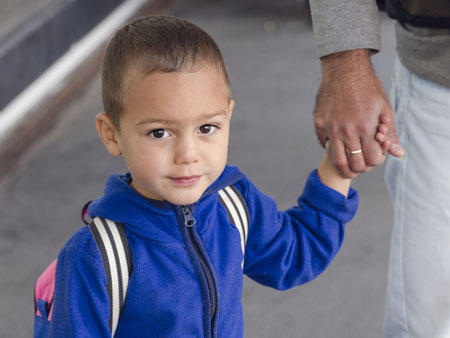Psychoeducation Is a Must for Bipolar Disorder
In 2018, researcher S.A. Soo and colleagues published a systematic review in the Journal of Clinical Psychiatry that analyzed findings from 40 randomized studies of psychoeducation for the management of bipolar disorder and compared the results for different types of psychoeducation: group, family, individual, and internet-based. Most of the randomized controlled trials (28 of 40 studies, 70.0%) assessed group or family psychoeducation, which had many benefits, while studies of individual or internet-based psychoeducation tended to be inconsistent.
The findings: “Group psychoeducation was associated with reduced illness recurrences, decreased number and duration of hospitalizations, increased time to illness relapse, better treatment adherence, higher therapeutic lithium levels, and reduced stigma. Family psychoeducation was associated with reductions in illness recurrence, hospitalization rates, and better illness trajectory as well as increased caregiver knowledge, skills, support, and sense of well-being and reduced caregiver burden.”
Editor’s Note: Given these results, it appears that group or family psychoeducation is a critical component to good care. Soo and colleagues suggest that future studies should directly compare different types of psychoeducation to each other to evaluate whether specific benefits are useful at various stages of illness.
Therapy Reduces Relapses, Promotes Medication Adherence
A 2017 meta-analysis published in the British Journal of Psychiatry indicates that psychosocial interventions were linked to reduced relapse rates, better adherence to medication, and other benefits in people with bipolar disorder. The meta-analysis by researcher Mary Lou Chatterton and colleagues evaluated data from 41 studies with a total of 3,119 participants. The studies examined psychosocial interventions such as cognitive-behavioral therapy, psychoeducation, and family-focused therapy compared to treatment as usual.
Chatterton and colleagues found that interventions that targeted family members who act as caregivers reduced manic and depressive relapse rates. Combined psychoeducation and cognitive-behavioral therapy was more successful than any other intervention, and had a large effect in reducing symptoms of mania. This combination also improved general functioning. Psychoeducation alone and in combination with cognitive behavioral therapy reduced medication non-adherence. Unfortunately, no intervention reduced depressive symptoms.
Family-Based Health Program Successful in Vermont
A statewide program to promote healthy behaviors within families has been successful in Vermont. The approach, described by researcher James J. Hudziak at the 2015 meeting of the American Academy of Child and Adolescent Psychiatry, is based on three assumptions. The first is that emotional and behavioral health is the cornerstone of all health. The second is that health behaviors are formed and sustained within families. The third is that promoting healthy behaviors, preventing illness, and intervening for better health outcomes are all important to enhancing the health of the population.
Vermont used community outreach (including town-hall public events), the media (including Twitter, blogs, radio, television, public service announcements, and a short film), and group trainings of community professionals to successfully spread health messages to families. The program targeted pediatricians’ offices, schools, community mental health centers, federally qualified health centers, and Departments of Health, Mental Health, and Child Welfare.
Hudziak has also suggested that programs of exercise, music, and mindfulness (all of which enhance brain growth and development) should be made universally available to children in school.
Family Intervention in Early Childhood Can Help Children Cope with Stress
Enduring stressful life events in childhood can affect children long-term. Children who experience neglect can show increased levels of cortisol, a stress hormone. Family interventions can reduce these levels, and a new study shows that the impact of these interventions can be lasting. The study, by Kristin Bernard and colleagues in the journal JAMA Pediatrics, included 115 children whose families had been referred to Child Protective Services after allegations of neglect. After an incident of neglect in early childhood, the families received either an experimental intervention called ABC (focused on increasing parental nurturance to child distress, increasing synchronous interactions, and decreasing frightening parental behavior) or a control intervention (which provided educational information about child development). When the children reached preschool age about three years later, the researchers collected the children’s cortisol levels at waking and bedtime on three different days.
The children whose families received the ABC intervention had more typical cortisol levels than those whose families had received the control intervention. The ABC children had higher morning cortisol, with a steeper decline throughout the day, compared to a more blunted cortisol rhythm in the control group children. These patterns resembled differences in the two groups observed three months after the initial intervention. The authors concluded that the ABC intervention has long-term effects on children’s physiological stress system, helping them maintain health and adjustment.
Specialty Treatment for First Episodes of Psychosis Effective
A study published online in the journal Psychiatric Services comparing a specialty clinic that provides medication, family education, cognitive-behavioral therapy (CBT), and case management to improve employment and educational outcomes with treatment as usual for people in a first episode of psychosis found that the specialty treatment was associated with fewer and shorter hospital stays and better vocational engagement during one year of follow-up.
Most participants were referred to the study from inpatient psychiatric units. Those randomly assigned to receive treatment as usual typically did so in outpatient treatment settings. Those randomly assigned to the specialty treatment group joined the Specialized Treatment Early in Psychosis (STEP) program at the Connecticut Mental Health Center, where they could choose from any of the available interventions.
Other studies have found that comprehensive intervention encompassing psychoeducation, family therapy and other services can reduce psychotic symptoms. The authors of this study, Vinod H. Srihari and colleagues, concluded that a US public-sector model of early intervention in psychotic illness could be both feasible and effective.
Editor’s Note: In the British Journal of Psychiatry in 2013, Kessing et al. demonstrated even more dramatic and persistent benefits (for at least 6 years) of 2 years of specialty clinic care versus treatment as usual for patients with a first hospitalization for mania (many of whom were also psychotic). Together these two articles indicate the extreme importance of getting off to a good start in the management of major psychiatric illness. Such specialty programs are desperately needed for better management of childhood-onset mania.






